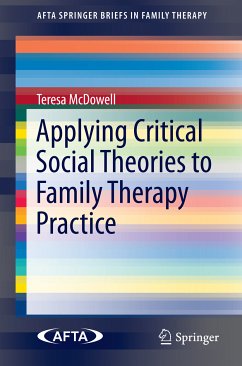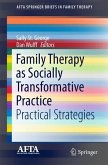- Strategies for asking clients about social class.
- A framework for understanding gender issues within the larger patriarchy.
- Guidelines for relating concepts of race and class in therapy.
- Structure for creating the family cartography.
- Ways to utilize a queer perspective in therapy.
- Illustrative case examples throughout.
Breaking new ground in family therapy, Applying Critical Social Theories to Family Therapy Practice challenges social workers, social work researchers, therapists, and psychologists to push beyond current ideas of social awareness and cultural competence toward truly liberatory client-centered practice.
Dieser Download kann aus rechtlichen Gründen nur mit Rechnungsadresse in A, B, BG, CY, CZ, D, DK, EW, E, FIN, F, GR, HR, H, IRL, I, LT, L, LR, M, NL, PL, P, R, S, SLO, SK ausgeliefert werden.









